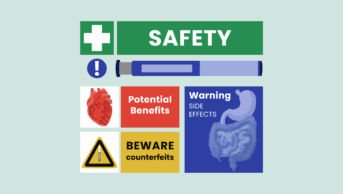
Shutterstock.com
The Medicines and Healthcare products Regulatory Agency (MHRA) has said it will look at safety measures around Janus kinase (JAK) inhibitors, following recommendations from the European Medicines Agency (EMA) introduced to minimise the risk of serious side effects, such as blood clots and cancer, associated with use of these medicines.
On 28 October 2022, the EMA’s safety committee recommended that JAK inhibitors should be used only if no alternative can be found, in those aged 65 years and over; those at increased risk of major cardiovascular problems; those who smoke or have done for a long time in the past; or those at an increased risk of cancer.
It also said that the drugs should be used “with caution” in other patients who have risk factors for blood clots in the lungs and deep veins, and that the doses be reduced in these patients and those at risk of cancer or major cardiovascular problems.
The recommendations follow a review of the available data on JAK inhibitors, which confirmed that tofacitinib (Xeljanz; Pfizer) increases the risk of major cardiovascular problems, cancer, venous thromboembolism (VTE), serious infections and death owing to any cause, when compared with tumour necrosis factor-alpha (TNF-a) inhibitors.
The committee concluded that the findings applied to all approved uses of JAK inhibitors in chronic inflammatory disorders, such as rheumatoid arthritis (RA), psoriatic arthritis, ulcerative colitis and atopic dermatitis, including abrocitinib (Cibinqo; Pfizer), filgotinib (Jyseleca; Galapagos Biotech Limited), baricitinib (Olumiant; Eli Lilly), upadacitinib (Rinvoq; AbbVie Ltd.), in addition to tofacitinib.
Alison Cave, chief safety officer at the MHRA, told The Pharmaceutical Journal: “In the UK, the JAK inhibitor tofacitinib should only be used in patients older than 65 years of age if there if is no suitable alternative due to the increased risk of serious side effects.
“We are aware of the recommendations from EMA’s safety committee and will consider this issue further and communicate any new advice to healthcare professionals and patients if appropriate,” she added.
“Patients should continue using their JAK inhibitors as prescribed and speak to their doctor if they have any concerns.”
The MHRA has previously produced advice to minimise the risk of VTE, serious and fatal infections, cardiac effects, and malignancy with tofacitinib, following the findings of a randomised clinical safety trial, ORAL surveillance, and it also published advice to minimise the risk of VTE with baricitinib and upadacitinib, which work similarly to tofacitinib.
Commenting on the recommendations, Andrew Pothecary, lead pharmacist, rheumatology and biologics, at Royal Cornwall Hospitals NHS Trust, said that tofacitinib was licensed in the United States several years before it became available in the UK.
“It launched at about the same time as baricitinib, which did have a warning about VTE from the start,” he said.
“I think the risks started to become evident as studies looking at higher doses of tofacitinib in inflammatory bowel disease began to be reported. The ORAL surveillance study also used a 10mg twice-daily dose of tofacitinib for treating patients with rheumatoid arthritis, and used anti-TNF (adalimumab or etanercept) as the comparator.”
Pothecary explained that the 10mg twice-daily regimen, tested in the ORAL surveillance study, was not licensed for treating RA in the UK, and the regimen was removed five years into the study after higher rates of pulmonary embolism were noted in that treatment group but not others.
“It’s also tricky to extrapolate the risk to other JAK inhibitors; there are several different JAK enzymes. Inhibiting JAK1 produces the desirable effects of the JAK inhibitors, whereas inhibiting JAK2 and -3 may result in some of the unwanted effects.
“All of the JAK inhibitors we use at present primarily inhibit JAK1 but there are differences in the extent to which they inhibit the other JAKs.”
Pothecary said although the risks of using JAK inhibitors for auto-immune disorders were “well-recognised” among the specialist teams that prescribe them, the risks may not be as well known in the wider medical, pharmacy and other professions.
“There perhaps does need to be better awareness so that if patients on tofacitinib or another JAK experience VTE, for example, this is brought to the attention of the prescribing team promptly rather than just waiting for it to be picked up at their next routine review.”


